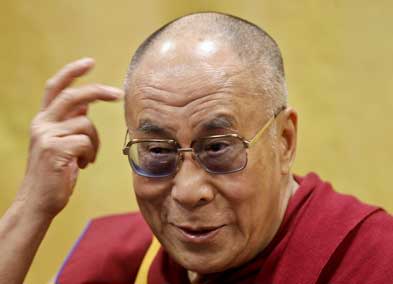 The Lookout
The LookoutChina rebuts Dalai Lama’s alleged poison plot
After the Dalai Lama accused China of trying to poison him, the Chinese government rebutted his claims and said that if it wanted the Tibetan spiritual leader dead, it could have done so without waiting until he was 76 years old.

The Dalai Lama told the Sunday Telegraph that he believed the Chinese government had trained women to put poison in their hair and scarves for him to touch when he blessed them. The newspaper said that he and his aides have not been able to confirm the plots.
It's common practice for the Dalai Lama to place his hands on devotees heads when he blesses them, reported the Associated Press. He's usually surrounded by crowds of followers when he travels outside of the northern Indian town of Dharmsala, where he lives.
The Global Times, an English-language, state-owned Chinese newspaper, criticized the Dalai's claims, blaming his age and said his claim had no credibility.
Why did the Dalai Lama decide to openly speak of this unconfirmed information? He spread the information of this kind at his pleasure, even more enthusiastically than the other ordinary Tibetan monks in exile. In fact, some of the rumors related to Tibet originated from the Dalai Lama.
Let's put it simply: If the central government wanted to "eliminate" the Dalai Lama, why has it waited for such a long time? Isn't it foolish to take action against Dalai at such an old age?
The assassination plot told by the Dalai is more like something you would find in a martial arts novel. Revealing such unreliable information, the Dalai appears to have become mixed up in his old age.
The Chinese government accused the Dalai Lama of stirring up trouble before the 18th National Congress of the Communist Party, when a new generation of Chinese leaders will be unveiled, the Sunday Telegraph reported.
Meantime, the Dalai Lama said he may end up being the last Dalai Lama because of Chinese interference in finding his reincarnation after his death.
